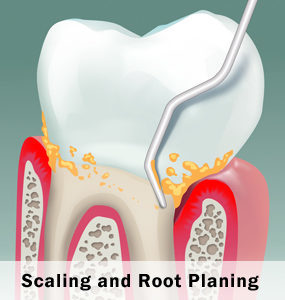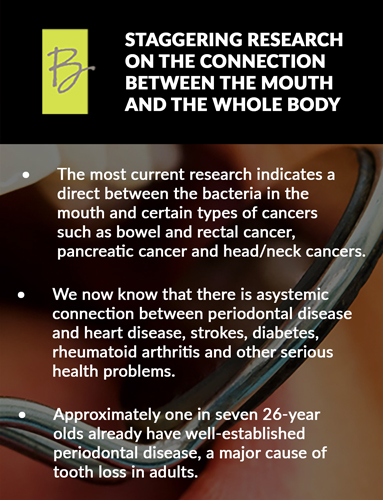Untreated periodontal disease (gum disease) can destroy your health. This condition is the leading cause of tooth loss among the adult population. Moreover, the infection associated with this condition is powerful enough to erode the gingiva and the jawbones. Detecting and treating periodontal disease as soon as possible is the best way to secure a good prognosis and control over the state of your oral health. Brown Family Dentistry offers diagnostic services and periodontal therapy to help combat the far-reaching effects of gum disease.
Diagnosing Periodontal Disease (Gum Disease)
Our team looks for signs of periodontal (gum disease) during every checkup and dental cleaning. If people keep regular appointments, they have a much higher chance of detecting issues with gum health early on. Early intervention may involve receiving regular dental cleanings and improving one’s oral hygiene regimen.
If checkups or cleanings reveal that periodontal disease is more advanced, our dentists may recommend other treatment options such as periodontal therapy (scaling and root planing and/or medications). Diagnosing and staging periodontal disease involves a physical examination of the gingiva – particularly the depth and width of periodontal pockets between teeth. Periodontal pockets form when tartar accumulates at the gum line. Tartar accumulation is typically caused by improper or inadequate oral hygiene. As tartar builds, the gums will recede from teeth and tartar will continue to build up along the gums and in between teeth. Periodontal disease is staged by measuring the size of these pockets and examining the appearance and feel of the gingiva. Once periodontal disease has been staged, our team can develop a custom treatment plan.
Scaling and Root Planing
 A popular and effective method for controlling the progression of gum disease is providing periodontal therapy (scaling and root planning). While these are technically two different forms of periodontal therapy, they are performed together. Scaling involves using dental instruments to gently remove tartar from teeth. Removing tartar in patients with more advanced gum disease involves accessing the gingiva below the gum line to reach tartar that has built up along the root surface of teeth. Once tartar is removed, root planing is performed to smooth the roots of teeth. Smoothing the roots of teeth helps prevent the attachment of new tartar.
A popular and effective method for controlling the progression of gum disease is providing periodontal therapy (scaling and root planning). While these are technically two different forms of periodontal therapy, they are performed together. Scaling involves using dental instruments to gently remove tartar from teeth. Removing tartar in patients with more advanced gum disease involves accessing the gingiva below the gum line to reach tartar that has built up along the root surface of teeth. Once tartar is removed, root planing is performed to smooth the roots of teeth. Smoothing the roots of teeth helps prevent the attachment of new tartar.
The objective of these non-surgical procedures is to remove disease causing agents such as dental plaque and tartar or calculus, which cause gingival inflammation and disease. Periodontal therapy (scaling and root planning) is normally performed in increments by dividing the mouth into quadrants. When treatment is successful, the most important benefit of periodontal therapy is that it will arrest or halt the progression of the disease moving the disease into remission.
Other Treatment Options
Sometimes our team may suggest special oral hygiene tools like water irrigators or mouth rinses to decrease harmful oral bacteria and thwart the development of more surface irritants like tartar. In some cases, an antibiotic called Arestin is placed directly in the infected areas, or pockets, in your gums. This antibiotic kills the bacteria that is causing the infection. In other instances, prescription medication may be used to control the infection present in the gingiva. For those with complex cases of periodontal disease, our team may refer patients to a specialist.
If you are concerned about gum disease or if it’s been a while since your last checkup, call Brown Family Dentistry to reserve an appointment.





